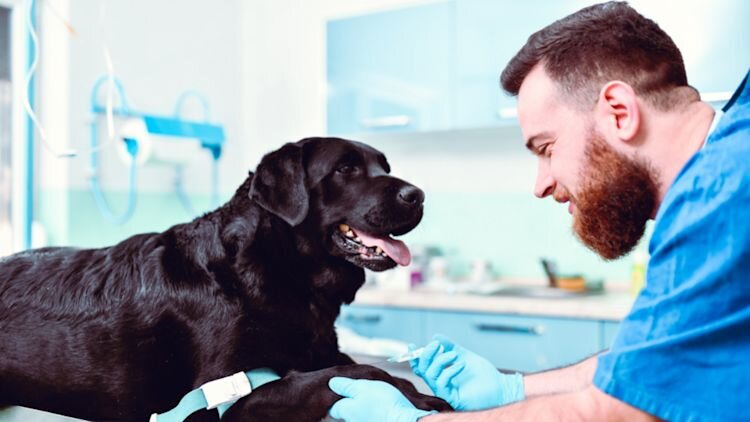Dog Vaccinations: What Vaccines Do Dogs Need?
Our canine companions can suffer from a range of dog health issues, many of which are caused by disease. Fortunately, as responsible pet parents, we can protect our pups from some of these life-threatening illnesses with a regular dog vaccination schedule. But with the number of vaccines and the doubts surrounding them, how can you know which dog vaccines are absolutely necessary?
Your vet will always be the best source of information when it comes to your specific dog vaccination schedule. That being said, we’re offering a general guide on what vaccines dogs need, when to start vaccinating a puppy, how often you should get vaccination boosters, and more.
- Why do dogs need vaccinations?
- What vaccines do puppies need?
- Puppy vaccination schedule
- How much do puppy vaccinations cost?
- What vaccines do dogs need?
- How much do dog vaccines cost?
- Booster vaccinations for dogs
- Can my dog get a titer test instead of a booster?
- What happens at a dog vaccination appointment?
- Are there any side effects to vaccines for dogs?
- What happens if your dog isn’t vaccinated?
- What does the law say?
- Key Takeaways
Pro Tip: Pet insurance doesn’t cover vaccinations but having all your dog’s vaccinations up to date could mean lower insurance premiums. In addition, if you don’t vaccinate your furry friend, and they get ill with a disease that could have been prevented with a vaccine, it’s unlikely your insurance company will cover the cost for treatment.
Why do dogs need vaccinations?
Vaccines protect your pup from various diseases, such as kennel cough, parvovirus, and heartworm. They work by giving a small amount of a dead or modified strain of the virus or bacteria your dog is being vaccinated against. By doing so, your pet’s immune system is being exposed to the bacteria or virus and trained to recognize and attack it. This means that if your dog encounters the disease in the future, their immune system will be able to fight it off, keeping them safe and healthy.
Besides protecting your pet, vaccines also protect other dogs around you by reducing the risk of infection.
What vaccines do puppies need?
Most veterinarians agree that the core puppy vaccines include DHPP (distemper, hepatitis, parvovirus, and parainfluenza). That means they should be given to all dogs, especially puppies due to their weakened immune systems.
However, with so many different vaccines, it can be difficult to determine which ones are necessary and which are optional. Here’s a quick overview of the many dog vaccinations that help prevent disease, some of which may be required by state governments and independent businesses (for boarding, doggy daycare, training classes, and similar activities).
Bordetella
Bordetella bronchiseptica is an infectious bacterium that causes severe coughing and vomiting, or in rare cases, death. It’s the primary cause of kennel cough, an inflammation of the upper airways caused by viral or bacterial infections, such as Bordetella and canine parainfluenza.
Typically, kennel cough causes mild bouts of dry coughing, but more severe cases also show signs like gagging, retching, and decreased appetite. The disease is very easily transmitted between pups that are kept close together (e.g. in an animal shelter or boarding facilities). Cough suppressants and usually given to make the animal more comfortable.
Distemper
Canine distemper is a disease caused by the paramyxovirus, a virus that affects the gastrointestinal, nervous, and respiratory systems of dogs and other animals. The disease is highly contagious and can be spread through coughing, sneezing, or by sharing infected equipment and bowls. The most common symptoms include discharge from the nose and eyes, thickened paw pads, diarrhea, vomiting, coughing, fever, seizures, and even death.
Parvovirus
This is another highly contagious virus that affects dogs of all ages but unvaccinated dogs and dogs under four months of age are at the greatest risk, parvo in puppies is very common. The virus attacks the GI system causing severe diarrhea, vomiting, fever, and decreased appetite. Many dogs die as a result of severe dehydration within 72 hours, which is why you need to see the vet immediately if your dog is showing these symptoms.
Canine Hepatitis (Adenovirus)
This viral infection affects the kidneys, liver, lungs, spleen, and eyes. The most common clinical signs include vomiting, fever, jaundice, pain around the liver, stomach enlargement, etc. In severe cases, canine hepatitis can result in death.
Canine Parainfluenza
Canine parainfluenza is a highly contagious respiratory disease and is one of the most common viruses that can contribute to kennel cough.
Lyme Disease
Lyme disease is a bacterial disease caused by the spirochete bacterium. It’s transmitted via ticks and causes limping, swelling of the lymph nodes, decreased appetite, and increased temperature. If left untreated, Lyme disease can affect the heart, joints, and kidneys or result in neurological disorders.
Leptospirosis
Leptospirosis is a bacterial infection caused by a type of bacteria called Leptospira. It’s a zoonotic disease, which means that it can be transmitted to people from animals. Most common symptoms include vomiting, diarrhea, fever, loss of appetite, lethargy, stiffness, muscle pain, jaundice, kidney failure, and infertility.
Heartworm
Heartworm in dogs involves worms that lodge in the canine’s heart and the pulmonary arteries, through which they can travel around the entire body and, in some cases, attack the kidneys and liver. In many cases, the disease is asymptomatic and dogs will start showing signs like coughing, lethargy, and difficulty breathing in later stages.
Rabies
Rabies is a viral disease that infects the central nervous system, causing headaches, excessive drooling, anxiety, hallucinations, paralysis, and even death. It’s most often transmitted through the bite of a rabid animal and needs to be treated immediately.
Your vet is the best source of information and can provide guidance on the initial puppy vaccines.

Puppy vaccination schedule
It should be noted that there’s no universal vaccination schedule that applies to all puppies. Some pups don’t need every vaccine. A number of factors come into play, such as your location and individual risk factors. Work with your vet to decide which vaccines your puppy needs and when they should get them.
That being said, below is a generally accepted vaccination schedule for a puppy’s first year:
- 6 to 10 weeks: DHPP (1), Bordetella
- 11 to 14 weeks: DHPP (2), canine influenza (1), leptospirosis (1), Lyme disease (1)
- 12 to 16 weeks: DHPP (3), canine influenza (2), leptospirosis (2), Lyme disease (2), rabies
Lyme disease and canine influenza vaccines are given depending on the dog’s lifestyle.
It is important to stay up to date with your puppy’s vaccination schedule. Don't run the risk of your puppy contracting one of these diseases when they’re so easily preventable.
In addition, be sure to keep your puppy away from unvaccinated dogs until they have had their full course of vaccinations and are fully protected.
How much do puppy vaccinations cost?
The average cost for the core vaccinations (vaccines that should be given to every dog no matter the circumstance) can range from $75 to $150. The rabies vaccination is usually between $15 and $25. Animal shelters often charge less for vaccination (about $20) and may even provide vaccines free of charge. In general, the costs for vaccination during a puppy’s first year are higher than during adulthood.
Keep in mind that the cost of your puppy’s vaccines also depends on a few factors, including your location. For instance, vets in rural areas and smaller towns tend to charge less than those located in more expensive urban areas.
Pro Tip: Pet wellness plans (also called routine pet care coverage or preventative pet care plans) might be optional on your pet insurance policy. With these, you typically pay a premium for the plan, and the insurance company will reimburse the costs associated with routine vet visits, such as vaccines and physical exams.
What vaccines do dogs need?
Puppies receive several rounds of vaccines in a short period of time. When your dog is an adult, their vaccination schedule is a bit different but equally important.
In certain regions, some puppy vaccines might be more necessary than others. However, as mentioned before, there are vaccines that must be given to every dog regardless of the circumstances, called core vaccinations. For instance, every dog must receive the rabies vaccine, regardless of whether rabies is prevalent in the area or environment.
Non-core vaccinations, on the other hand, are only necessary for regions where the disease is common or if the dog will be at increased risk of exposure.
The list of common adult dog vaccines includes:
- Distemper virus
- Parvovirus
- Adenovirus (Hepatitis)
- Parainfluenza virus
- Rabies virus
- Bordetella (Kennel Cough)
- Leptospirosis
- Lyme disease
- Canine influenza virus
If you have any questions related to vaccines, contact your vet. They’ll be able to help you determine which vaccines are necessary in order to keep your dog safe and healthy.
How much do dog vaccines costs?
Again, the price of vaccines will vary depending on where you live, your pet’s age, and varying vet charges. In general, the cost of immunization of adult dogs ranges from $60 - $150 annually. Low-cost clinics often charge $10 - $15 per shot, whereas private practices usually charge $15 - $40 per shot plus a $30 - $60 examination fee.
Booster vaccination schedule for dogs
Your dog will need to get booster vaccinations throughout their life to maintain the vaccines’ protection from disease. The reason for this is that the protection they offer becomes less effective over time. Some boosters are received annually, while others are required every three years.
The dog vaccinations schedule for boosters is:
- Annual vaccine boosters for Bordetella (kennel cough), leptospirosis, Lyme disease, and canine influenza
- Booster vaccination for distemper, canine hepatitis, parvovirus, and rabies every three years
Older dogs still need regular boosters to protect them from potentially fatal diseases, especially as their immune systems weaken as they get older. Consult your veterinarian about your senior dog’s needs to make sure they stay protected.

Can my dog get a titer test instead of a booster?
Some veterinarians might offer ‘titer testing’ for certain diseases to check your dog’s level of immunity. Titer testing is not an alternative to booster vaccines, as it only gives you an idea of how well your dog is protected from vaccinations they have already received. In addition, this blood test is not available for every disease and it can’t guarantee that your dog is 100% protected. It is also important to note that titer testing can range between $100-$300 per disease titer, so it is far cheaper to get booster vaccines.
Vets usually recommend titer tests when pet parents aren’t sure whether to give a certain vaccine due to previous allergic reactions to vaccines or because the dog’s immune system has been compromised. In these cases, the titer test can help decide whether it is better to vaccinate your pet or skip the booster shot.
What happens at a dog vaccination appointment?
Once you find a nearby vet and make a vaccination appointment, your veterinarian will perform a full physical examination to ensure that your dog is healthy. If there are no signs of injuries or illnesses, the vet will review the pet’s vaccination history.
The vaccines will then be given under the skin and the staff will let you know where they were administered.The only exception is the kennel cough (bordetella) vaccine, which can be administered into the nose.
Are there any side effects of vaccines for dogs?
Adverse reactions to vaccinations are rare in dogs. If your canine friend does experience any adverse vaccine reaction, symptoms might include:
- Diarrhea
- Vomiting
- Sluggishness
- Fever
- Loss of appetite
- Pain or swelling around the injection site
- Facial or paw swelling
- Hives
- Difficulty breathing
- Collapse
- Seizures (anaphylactic shock)
To stay on the safe side, it’s best to have your pup vaccinated at a time when you can monitor them after they get the shot.
It should be noted that the benefits of vaccines far outweigh any risks. In most cases, the symptoms are mild and will go away after a short while. However, if your dog is having a severe reaction to a vaccine, be sure to call your vet right away.
What happens if your dog isn’t vaccinated?
If you don’t vaccinate your dog, they will have a significantly greater chance of contracting a disease that could be fatal. They also risk passing illness onto other dogs and humans.
What does the law say?
Nowadays, most U.S. states require dogs to be vaccinated against rabies. Any pet owner who hasn’t vaccinated their pet against this disease could face steep fines and potential jail time.
Although rabies is the only dog vaccination legally required by the CDC, authorities also highly recommend that dogs receive all the core vaccines: distemper virus, adenovirus type 2, canine parvovirus, and canine hepatitis.
Key Takeaways
- Vaccines can help protect your beloved canine companion against some potentially deadly diseases, such as canine distemper, leptospirosis, parvovirus, and hepatitis.
- Small puppies can start their vaccinations from about eight weeks of age and will need a second set of shots, usually two to four weeks after their first set.
- After having their initial vaccinations as puppies, adult dogs will need regular booster vaccines throughout their life to keep them protected as their immunity could otherwise go away over time.
- If you have any questions about canine vaccines or concerns about vaccination safety, be sure to speak to your veterinarian or vet nurse.
Do you want to find the best pet insurance?
Let's analyze your pet's breed, age, and location to find the right coverage and the best savings. Ready?
Analyze My PetAbout Pawlicy Advisor
The pet insurance marketplace endorsed by veterinarians, at Pawlicy Advisor we make buying the best pet insurance easier. By comparing personalized coverage and pricing differences we can save you a ton of money, up to 83% in some instances!
Instantly Compare Pet Insurance Plans
Guides
Determine If Pet Insurance Is Worth It
Comparison Charts
Find Your State
Dog Insurance
DVM
Ricky Walther, DVM, is a small animal general practitioner in the greater Sacramento, California area. Realizing the positive financial and medical impact that pet insurance can provide for pet parents and the profession, he lends support and advice to companies like Pawlicy Advisor "The Pet Insurance Marketplace") that simplify the process of connecting with veterinary financing resources.
